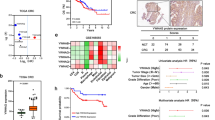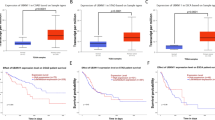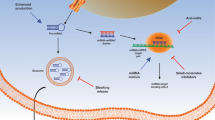Abstract
Recently, more and more evidence are rapidly accumulating that long noncoding RNAs (lncRNAs) are involved in human tumorigenesis and misregulated in many cancers, including colon cancer. LncRNA could regulate essential pathways that contribute to tumor initiation and progression with their tissue specificity, which indicates that lncRNA would be valuable biomarkers and therapeutic targets. Colon cancer-associated transcript 1 (CCAT1) is a 2628 nucleotide-lncRNA and located in the vicinity of a well-known transcription factor c-Myc. CCAT1 has been found to be upregulated in many cancers, including gastric carcinoma and colonic adenoma-carcinoma. However, its roles in colon cancer are still not well documented and need to be investigated. In this study, we aim to investigate the prognostic value and biological function of CCAT1 and discover which factors may contribute to the deregulation of CCAT1 in colon cancer. Our results revealed that CCAT1 was significantly overexpressed in colon cancer tissues when compared with normal tissues, and its increased expression was correlated with patients’ clinical stage, lymph nodes metastasis, and survival time after surgery. Moreover, c-Myc could promote CCAT1 transcription by directly binding to its promoter region, and upregulation of CCAT1 expression in colon cancer cells promoted cell proliferation and invasion. These data suggest that c-Myc-activated lncRNA CCAT1 expression contribute to colon cancer tumorigenesis and the metastatic process and could predict the clinical outcome of colon cancer and be a potential target for lncRNA direct therapy.




Similar content being viewed by others
References
Siegel R, Naishadham D, Jemal A. Cancer statistics, 2013. CA Cancer J Clin. 2013;63(1):11–30. doi:10.3322/caac.21166.
Capon DJ, Seeburg PH, McGrath JP, Hayflick JS, Edman U, Levinson AD, et al. Activation of Ki-ras2 gene in human colon and lung carcinomas by two different point mutations. Nature. 1983;304(5926):507–13.
Forrester K, Almoguera C, Han K, Grizzle WE, Perucho M. Detection of high incidence of K-ras oncogenes during human colon tumorigenesis. Nature. 1987;327(6120):298–303. doi:10.1038/327298a0.
Powell SM, Zilz N, Beazer-Barclay Y, Bryan TM, Hamilton SR, Thibodeau SN, et al. APC mutations occur early during colorectal tumorigenesis. Nature. 1992;359(6392):235–7. doi:10.1038/359235a0.
Wu WK, Law PT, Lee CW, Cho CH, Fan D, Wu K, et al. MicroRNA in colorectal cancer: from benchtop to bedside. Carcinogenesis. 2011;32(3):247–53. doi:10.1093/carcin/bgq243.
Ling H, Spizzo R, Atlasi Y, Nicoloso M, Shimizu M, Redis RS, et al. CCAT2, a novel noncoding RNA mapping to 8q24, underlies metastatic progression and chromosomal instability in colon cancer. Genome Res. 2013;23(9):1446–61. doi:10.1101/gr.152942.112.
Fujiya M, Konishi H, Mohamed Kamel MK, Ueno N, Inaba Y, Moriichi K, et al. MicroRNA-18a induces apoptosis in colon cancer cells via the autophagolysosomal degradation of oncogenic heterogeneous nuclear ribonucleoprotein A1. Oncogene. 2013. doi:https://doi.org/10.1038/onc.2013.429.
Zhang L, Dong Y, Zhu N, Tsoi H, Zhao Z, Wu CW, et al. MicroRNA-139-5p exerts tumor suppressor function by targeting NOTCH1 in colorectal cancer. Mol Cancer. 2014;13(1):124. doi:10.1186/1476-4598-13-124.
Djebali S, Davis CA, Merkel A, Dobin A, Lassmann T, Mortazavi A, et al. Landscape of transcription in human cells. Nature. 2012;489(7414):101–8. doi:10.1038/nature11233.
Mercer TR, Dinger ME, Mattick JS. Long non-coding RNAs: insights into functions. Nat Rev Genet. 2009;10(3):155–9. doi:10.1038/nrg2521.
Ponting CP, Oliver PL, Reik W. Evolution and functions of long noncoding RNAs. Cell. 2009;136(4):629–41. doi:10.1016/j.cell.2009.02.006.
Geisler S, Coller J. RNA in unexpected places: long non-coding RNA functions in diverse cellular contexts. Nat Rev Mol Cell Biol. 2013;14(11):699–712. doi:10.1038/nrm3679.
Nagano T, Fraser P. No-nonsense functions for long noncoding RNAs. Cell. 2011;145(2):178–81. doi:10.1016/j.cell.2011.03.014.
Lee JT. Epigenetic regulation by long noncoding RNAs. Science. 2012;338(6113):1435–9. doi:10.1126/science.1231776.
Cheetham SW, Gruhl F, Mattick JS, Dinger ME. Long noncoding RNAs and the genetics of cancer. Br J Cancer. 2013;108(12):2419–25. doi:10.1038/bjc.2013.233.
Nissan A, Stojadinovic A, Mitrani-Rosenbaum S, Halle D, Grinbaum R, Roistacher M, et al. Colon cancer associated transcript-1: a novel RNA expressed in malignant and pre-malignant human tissues. Int J Cancer. 2012;130(7):1598–606. doi:10.1002/ijc.26170.
Yeager M, Orr N, Hayes RB, Jacobs KB, Kraft P, Wacholder S, et al. Genome-wide association study of prostate cancer identifies a second risk locus at 8q24. Nat Genet. 2007;39(5):645–9. doi:10.1038/ng2022.
Zanke BW, Greenwood CM, Rangrej J, Kustra R, Tenesa A, Farrington SM, et al. Genome-wide association scan identifies a colorectal cancer susceptibility locus on chromosome 8q24. Nat Genet. 2007;39(8):989–94. doi:10.1038/ng2089.
Chen H, Xu J, Hong J, Tang R, Zhang X, Fang JY. Long noncoding RNA profiles identify five distinct molecular subtypes of colorectal cancer with clinical relevance. Mol Oncol. 2014. doi:https://doi.org/10.1016/j.molonc.2014.05.010.
Zhu YP, Bian XJ, Ye DW, Yao XD, Zhang SL, Dai B, et al. Long noncoding RNA expression signatures of bladder cancer revealed by microarray. Oncol Lett. 2014;7(4):1197–202. doi:10.3892/ol.2014.1843.
Wu ZH, Wang XL, Tang HM, Jiang T, Chen J, Lu S, et al. Long non-coding RNA HOTAIR is a powerful predictor of metastasis and poor prognosis and is associated with epithelial-mesenchymal transition in colon cancer. Oncol Rep. 2014;32(1):395–402. doi:10.3892/or.2014.3186.
Alaiyan B, Ilyayev N, Stojadinovic A, Izadjoo M, Roistacher M, Pavlov V, et al. Differential expression of colon cancer associated transcript1 (CCAT1) along the colonic adenoma-carcinoma sequence. BMC Cancer. 2013;13(1):196. doi:10.1186/1471-2407-13-196.
Xiang JF, Yin QF, Chen T, Zhang Y, Zhang XO, Wu Z, et al. Human colorectal cancer-specific CCAT1-L lncRNA regulates long-range chromatin interactions at the MYC locus. Cell Res. 2014;24(5):513–31. doi:10.1038/cr.2014.35.
Yang F, Xue X, Bi J, Zheng L, Zhi K, Gu Y, et al. Long noncoding RNA CCAT1, which could be activated by c-Myc, promotes the progression of gastric carcinoma. J Cancer Res Clin Oncol. 2013;139(3):437–45. doi:10.1007/s00432-012-1324-x.
Huarte M, Guttman M, Feldser D, Garber M, Koziol MJ, Kenzelmann-Broz D, et al. A large intergenic noncoding RNA induced by p53 mediates global gene repression in the p53 response. Cell. 2010;142(3):409–19. doi:10.1016/j.cell.2010.06.040.
Feldstein O, Nizri T, Doniger T, Jacob J, Rechavi G, Ginsberg D. The long non-coding RNA ERIC is regulated by E2F and modulates the cellular response to DNA damage. Mol Cancer. 2013;12(1):131. doi:10.1186/1476-4598-12-131.
Sun M, Liu XH, Lu KH, Nie FQ, Xia R, Kong R, et al. EZH2-mediated epigenetic suppression of long noncoding RNA SPRY4-IT1 promotes NSCLC cell proliferation and metastasis by affecting the epithelial-mesenchymal transition. Cell Death Dis. 2014;5:e1298. doi:10.1038/cddis.2014.256.
Acknowledgments
This study was supported by the National Natural Science Foundation of China (81172266 to ZNF), the Life Health Technology Foundation of Jiangsu province (BL2012031), and the Natural Science Foundation of Jiangsu province (BK2011859 to ZNF).
Conflicts of interest
None
Author information
Authors and Affiliations
Corresponding author
Additional information
Xiaolu He and Xueming Tan contributed equally to this work.
Rights and permissions
About this article
Cite this article
He, X., Tan, X., Wang, X. et al. C-Myc-activated long noncoding RNA CCAT1 promotes colon cancer cell proliferation and invasion. Tumor Biol. 35, 12181–12188 (2014). https://doi.org/10.1007/s13277-014-2526-4
Received:
Accepted:
Published:
Issue Date:
DOI: https://doi.org/10.1007/s13277-014-2526-4




